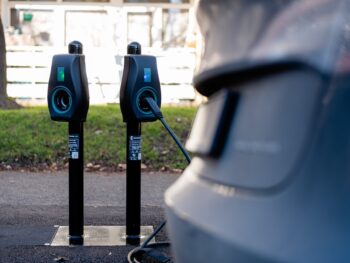Smart charging rollout on public network could save EV drivers billions
Connected Kerb is rolling out smart charging across its nationwide public network in a move that could collectively save drivers £1.5bn a year.

Credit: Andy Hughes
The nationwide scheme will see smart charging enabled at over 6,000 Connected Kerb on-street and car park charge points, with 4,000 more set to be deployed in 2024 – acting as a blueprint for the UK’s rollout of public smart charging.
It’s the first time that scheduled charging during off-peak hours has become available on a public charging network, enabling drivers to use energy when it’s cheapest and greenest.
Already successful trialled, Connected Kerb’s new public smart charging offering will see lower overnight tariffs of £0.45 per kWh for drivers, extending the full benefits of smart charging to everyone. Thanks to the lower costs, drivers could save up to £222 per year on charging, the equivalent of 495 free EV miles – enough to drive from Exeter to Edinburgh. Collectively, this could see an annual savings of £1.5bn for drivers by 2030.
Ben Boutcher-West, chief digital officer at Connected Kerb, said: “Public smart charging is the catalyst we need to create a fairer, greener, and cheaper charging network. We know that just under two thirds of people in the UK don’t have access to a home charger, which is why we’re committed to levelling the playing field between those who can access smart charging and those who can’t.
“By increasing the speed of charging when energy is cheapest, we can now offer drivers lower-cost tariffs, maximise the use of green energy and take strain off the grid. Our rollout of public smart charging isn’t just a major milestone for Connected Kerb, but the UK’s EV transition as a whole, bringing our public charging network one stop closer to democratising the gap between those with and without off-street parking.”
The launch of smart charging on the public network levels the field between public and home charging. Currently, VAT on the public charging network is set at four times the cost of home charging, meaning that drivers reliant on the public network are faced with additional costs.
To accelerate the UK’s shift to electric vehicles at the pace required to address the UK’s transport emissions, tackling the inequities between drivers remains essential. By making smart charging publicly accessible, Connected Kerb’s rollout will play a fundamental role in addressing this imbalance.
The first areas to benefit from Connected Kerb’s smart charging rollout will be the regions of Lincoln, Scarborough, Ryedale and Sunderland.
Drivers can benefit most from Connected Kerb’s smart charging capabilities by scheduling a charge from 7pm onward, any day of the week through the company’s app. Once plugged in and scheduled, charging will begin at midnight and carry on until 7am or until the EV battery is fully charged.
The benefits of reduced energy prices between 12am and 7am are directly passed onto the user through a reduced tariff of £0.45 per kWh, 22.4% lower than the average rate of the UK’s fast (7-22kW AC) charging network, providing considerable cost savings for users.
Smart charging on Connected Kerb’s network will be available to users through its newly launched mobile app, enabling quick, easy and convenient set-up of overnight charging
Anthony Browne, Minister for Technology and Decarbonisation, said: “We want people to be able to charge their EV in a way that works for them, so it’s great to see public smart charging providing opportunities for drivers to save money.
“This has been made possible by Government-funded research, which is now translating into new cheaper charging options for those charging outside their home – a prime example of how industry and Government can work together to support greener travel.”
Connected Kerb’s government-backed trial of public smart charging revealed it could deliver major benefits to the grid by slashing peak energy demand while also cutting charging costs. Dubbed Agile Streets, the study revealed that peak energy demand could be cut by 240MW by 2030, the equivalent to boiling over 1.4 million kettle. This in turn directly reduces the use of fossil fuels to generate energy, which is imperative to meet the UK’s legally binding target of net zero emissions by 2050.













Leave a comment